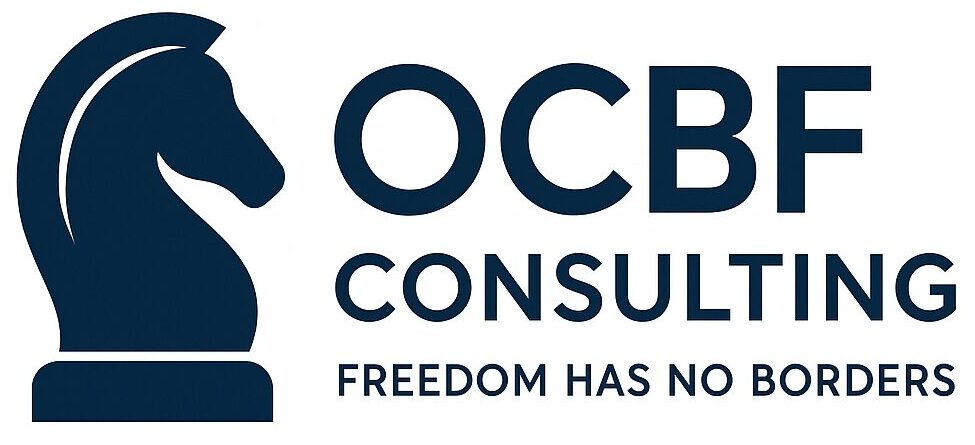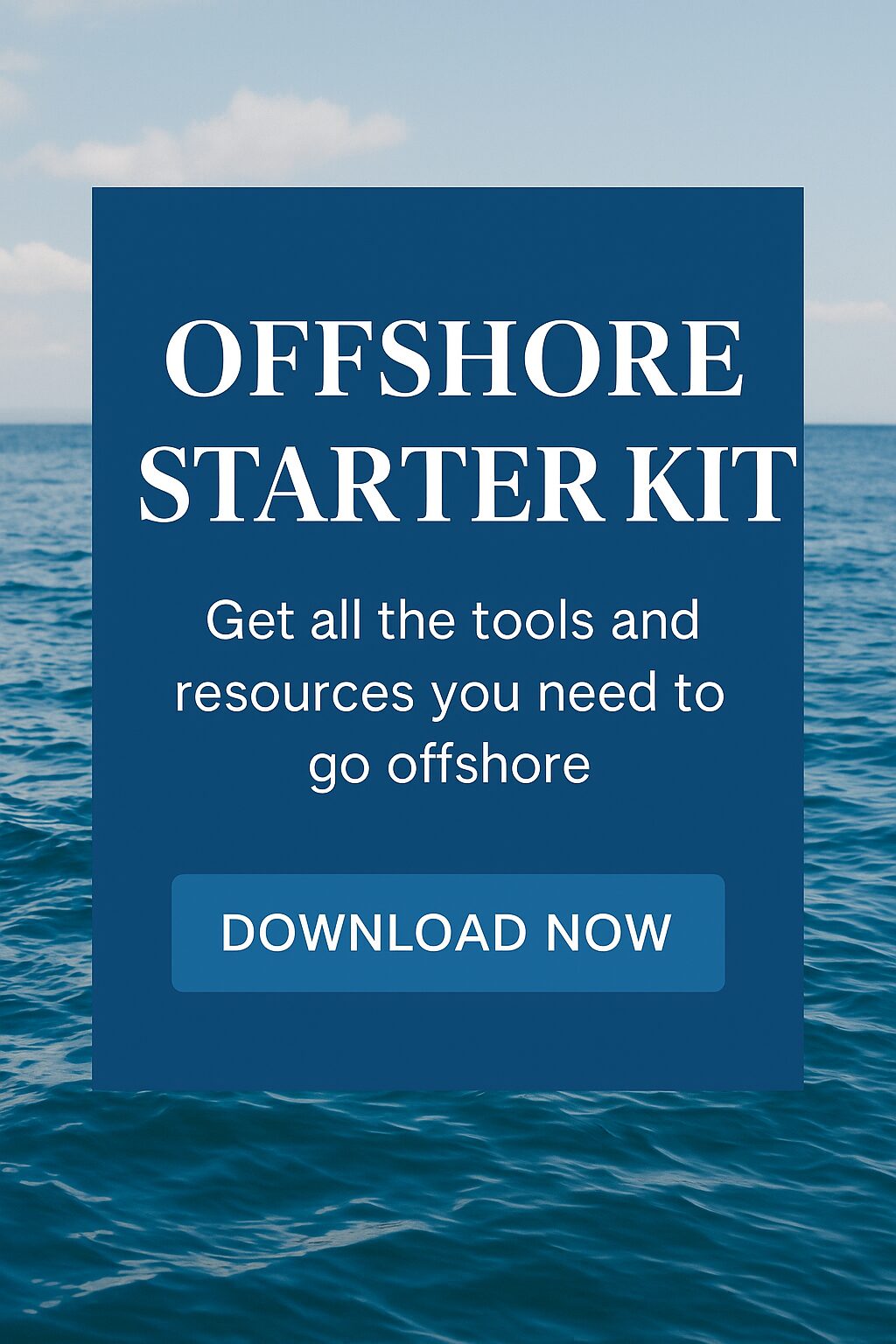It was just after sunrise in Bangkok when Hannah checked her email and saw the subject line every expat dreads:
“Notice of Account Closure — Relationship Termination.”
Her Caribbean bank, once the cornerstone of her offshore structure, had “reassessed its risk appetite.” Translation: U.S. citizen, digital income, too much compliance headache.
Hannah wasn’t alone. All over the world, remote professionals, entrepreneurs, and global citizens have been discovering that the offshore banking landscape of old — anonymous accounts, instant wires, quiet privacy — no longer exists (even minimums in Swiss Banks have changed).
What remains, however, is more resilient, more transparent, and, for those who adapt, far more powerful.
Because while hundreds of offshore banks have shuttered or restricted foreign clients, a handful still work — efficiently, legally, and globally — in 2025.
This is the shortlist that survived the purge.

Opening an Offshore Bank Account?
Avoid KYC mistakes and rejection with this 70+ page Offshore Banking Quick Start Guide.
Instant Access — $9
Get the GuideThe New Offshore Reality
Offshore banking hasn’t disappeared; it’s evolved.
The OECD’s new Crypto-Asset Reporting Framework (CARF), the CRS 2.0 amendments, and tightening FATCA enforcement have turned once-secret havens into digital fortresses of compliance.

The consequence? Many small Caribbean and Pacific banks that thrived on secrecy simply couldn’t afford the technology or compliance staff to survive. The survivors are those that embraced regulation — and invested in digital infrastructure. This guide is for you if you are looking for crypto acceptable banks.
Today, offshore banking means something different:
not secrecy, but sovereignty.
It’s about controlling where your money lives, how it moves, and under what laws it’s protected.
How We Chose Offshore Banks That Still Work
To separate myth from reality, OCBF’s 2025 Offshore Banking Review used five criteria:
- Regulatory soundness and capitalization.
- Willingness to bank non-residents and U.S. persons.
- Remote onboarding and digital-first infrastructure.
- Multi-currency access and integration with modern fintechs.
- Crypto and digital-asset tolerance.
Each of the five banks below meets these standards — and each, in its own way, represents a different philosophy of offshore finance.
DBS Bank (Singapore) — The Digital Fortress
If offshore banking had a gold standard, it would be DBS. Singapore’s largest bank has turned regulatory rigor into a competitive advantage.
Its DBS My Account product advertises no minimum balance for retail customers, but in practice foreign clients must pass strict KYC and demonstrate legitimate economic ties — or incorporate locally.
Business accounts for offshore entities are possible through DBS Corporate Banking, though the process can take several weeks and requires certified documentation and video verification.
For investors, DBS leads the region in institutional-grade digital-asset integration. Its DBS Digital Exchange (DDEx) and DBS Digital Custody services allow accredited investors to trade and hold crypto under Monetary Authority of Singapore supervision.
It’s not easy money — but it’s real money: fully compliant, secure, and globally connected.
Think of DBS as the offshore bank for people who plan to stay visible and legitimate for decades to come.
RAKBANK & Mashreq (UAE) — The Middle-East Gateway
In the UAE, the phrase “bank account opening” is both art and endurance test. Yet for those who persist, the rewards are unmatched: 0 % corporate tax on foreign income, solid USD rails, and a banking culture fluent in English, crypto, and compliance.
RAKBANK’s RAKstarter account offers no minimum balance for SMEs, while its higher tiers require an average AED 25,000 balance to avoid fall-below fees.
Mashreq NEO BIZ runs on a similar model: the Lite plan has zero balance but a AED 200 monthly fee; the Prime tier waives fees with a AED 50,000 average balance.
Both support online onboarding for UAE-registered companies — especially those in RAK ICC and DMCC free zones — though an Emirates ID or local presence still accelerates approval.
Crypto? Officially neutral, pragmatically tolerant. Licensed entities in Dubai’s VARA regime already transact through these banks, provided source-of-funds documentation is airtight.
For entrepreneurs running international consultancies or e-commerce brands, the UAE has become the new offshore capital — not because it hides assets, but because it respects mobility.
Bank of Georgia — The Nomad’s Bank
Few countries have reinvented their banking sector as effectively as Georgia.
Nestled between Europe and Asia, it has quietly positioned itself as the expat’s back-office: pragmatic regulators, low fees, and a currency that plays well with others.
Both Bank of Georgia and TBC Bank allow non-resident onboarding, sometimes remotely.
Minimum deposits start around 1 GEL (less than a U.S. dollar), though you’ll need a modest ongoing balance to avoid inactivity fees.
What makes Georgia stand out is its crypto-friendly stance. The National Bank regulates VASPs lightly, enabling transparent on- and off-ramps without heavy taxation.
BOG and TBC don’t market themselves as “crypto banks,” yet they routinely accept clients whose income originates from verified digital-asset activity.
Add to that a business-friendly visa policy, low tax rates, and a cost of living that’s a fraction of Western Europe, and it’s clear why Georgia has become the unofficial treasury for digital nomads.
Caye International Bank (Belize) — The Private Bridge
For many expats, the Caribbean dream ended when local banks closed their doors to foreign clients. Caye International Bank is the rare exception.
Founded in 2003 under a Belize IFSC license, Caye remains one of the few institutions still opening accounts for non-residents — including U.S. citizens under full FATCA compliance.
The entry threshold is refreshingly attainable:
- Demand Deposit Account: minimum USD 2,000.
- Term Deposit Account: USD 25,000 minimum, 6- to 24-month terms.
Caye provides secure online banking, multi-currency options (USD, EUR, GBP, CAD, CHF), and personalized service that feels almost anachronistic in 2025.
Crypto, however, is where it draws the line: no ICOs, no exchange operations. Blockchain-related businesses can apply, but must show detailed source-of-funds documentation.
For small offshore companies or individuals seeking a classic private-bank feel without million-dollar minimums, Caye remains a quiet stalwart in a turbulent region.

LGT Bank (Liechtenstein) — The Old-World Stronghold
At the other end of the spectrum lies LGT Bank, where discretion meets dynastic wealth.
Owned by the Princely House of Liechtenstein, LGT operates like a modern family office with a private-bank charter.
Typical onboarding begins around €1 million, though some relationship managers accept clients from €300,000 – €500,000 depending on structure and introduction.
It’s not for freelancers or startups — it’s for those building legacies.
LGT’s innovation lies in how it fuses tradition with tech. In partnership with SEBA (Amina) Bank, it now offers Bitcoin and Ethereum custody and brokerage for private-bank clients under Liechtenstein’s Blockchain Act (TVTG).
The result: an institution as comfortable holding tokenized assets as it is managing blue-chip portfolios.
U.S. persons are accepted under FATCA IGA channels, albeit with tailored investment universes.
For trusts, foundations, and family structures, LGT is the offshore world’s most reputable vault.
The Offshore Banking Quick Start Guide is a 70+ page, no-fluff blueprint that takes you from “I don’t know what to do” to submitting a bank-ready offshore application with confidence.
Get the Offshore Banking Quick Start Guide ($9)
Comparison of Offshore Banks That Still Work in 2025
| Bank | Jurisdiction | Minimum Deposit | Accepts U.S. Clients | Crypto Policy | Remote Opening | Key Strength |
|---|---|---|---|---|---|---|
| DBS Bank | Singapore | None (retail) / varies for business | Yes (FATCA compliant) | Institutional only via DBS Digital Exchange | Partial (verified video KYC for business) | Regulated hub with digital exchange |
| RAKBANK / Mashreq | UAE | AED 0 – 50k (≈ USD 0 – 13.6k) | Yes | Cautious but VARA-tolerant for licensed clients | Yes (with Emirates ID preferred) | Tax-free multi-currency SME banking |
| Bank of Georgia / TBC | Georgia | ≈ 1 GEL (USD 0.40) | Yes (with FATCA paperwork) | Friendly to crypto income with proof | Often possible remotely + in-branch | Low-friction bank for digital nomads |
| Caye International Bank | Belize | USD 2,000 (demand) / USD 25k (term) | Yes | Conservative – no exchanges or ICOs | Yes (remote KYC accepted) | Rare Caribbean bank still open to expats |
| LGT Bank | Liechtenstein | €300k – €1 million | Yes | Full crypto custody & brokerage via SEBA Bank | No (full relationship onboarding) | AAA stability + blockchain innovation |
The Banks We Lost
Not long ago, names like Butterfield Bahamas, Euro Pacific, and Bank Julius Baer’s offshore desks were staples of global banking.
By 2025, most have either merged, refocused on domestic clients, or exited retail offshore banking altogether.
It’s a reminder that reputation without infrastructure no longer counts.
The winners are those that paired compliance budgets with innovation.
Hidden Costs and Realities
Even the “best” offshore banks demand patience.
Expect weeks of document requests, video calls, and source-of-wealth narratives that feel more like therapy than banking.
Minimums aside, the true costs often hide elsewhere:
FX spreads that nibble two percent per transfer, wire fees north of USD 40, and compliance refreshes every 12 months.
The trade-off is stability. These are banks that will not vanish overnight because a correspondent got nervous.
For smaller nomads, pairing a fintech wallet like Wise, Revolut Business, or Mercury Global with one of these offshore banks creates the perfect balance: liquidity via fintech, durability via legacy banking.
Top 5 Offshore Banks That Still Work in 2025 – Looking Toward 2028
Over the next few years, CRS 2.0 and CARF will make cross-border data exchange routine.
That may sound invasive, but it will also make legitimate offshore banking simpler: once the paperwork normalizes, fewer banks will reject applicants out of fear.
Expect more fintech-bank hybrids, tokenized deposits, and instant SWIFT-to-blockchain conversions.
The offshore bank of 2028 will look less like a marble building and more like an API — regulated, visible, but globally portable.
Conclusion — Banking Without Borders
The myth of the hidden offshore account is dead.
What replaces it is something better: a transparent, global banking ecosystem that rewards those who understand both compliance and freedom.
In 2025, the real question isn’t “Which bank hides my money best?”
It’s “Which bank lets my money move, legally, wherever I am?”
These five — DBS, RAK/Mashreq, Bank of Georgia, Caye Bank, and LGT — are proving that offshore banking isn’t disappearing; it’s just growing up.
If you’re ready to choose the right one and design your full structure, start with The Offshore Starter Pack — your blueprint for privacy, protection, and freedom in the new financial world.

Before You Apply for Any Offshore Bank Account…
Most offshore applications are rejected for simple KYC and documentation issues. If you found this article useful, you’ll get even more value from the Offshore Banking Quick Start Guide — a 70+ page, step-by-step checklist used by entrepreneurs and crypto investors to submit bank-ready applications.
- Know exactly which documents banks expect to see
- Avoid the 12 most common rejection triggers
- Follow a 7-day plan to get your first account approved
Instant digital access. Just $9.
Get the Offshore Banking Guide









